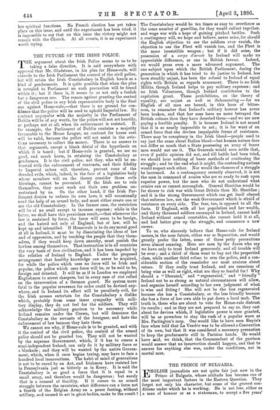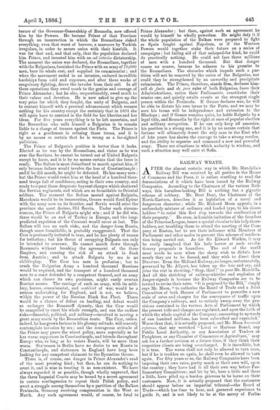THE PRINCE OF BULGARIA.
ENGLISH journalists are not quite fair just now to the Prince of Bulgaria, whose attitude has become one of the most important factors in the Eastern Question. They forget not only his character, but some of the gravest con- ditions under which he is working. He is not free, either as a man of honour or as a statesman, to accept a five years'
tenure of the Governor-Generalship of Roumelia, now offered him by the Powers. He became Prince of that Province through an insurrection in which the Roumelians risked everything, even that worst of horrors, a massacre by Turkish irregulars, in order to secure union with their kinsfolk. It was for that end, and that only, that the population declared him Prince, and invested him with an ad interim dictatorship. The moment the union was declared, the Roumelians, together with the Bulgarians, furnished the Prince with an army of 70,000 men, bore its whole cost, and supplied its commissariat ; and when the movement ended in an invasion, endured incredible hardships from cold and exposure, and after three weeks of sanguinary fighting, drove the invader from their soil. In all these operations they owed much to the genius and courage of Prince Alexander ; but he also, unquestionably, owed much to their valour and devotion. He is now asked to give up the very prize for which they fought, the unity of Bulgaria, and to content himself with a personal advancement which secures nothing for his country except the certainty that in 1891 she will again have to contend in the field for her liberties and her ideas. For five years everything is to be left uncertain, and the Roumelian who calls himself a Bulgarian is to remain liable to a charge of treason against the Porte. The Prince is right as a gentleman in refusing those terms, and it is by no means so certain that he is wrong as a far-sighted politician.
The Prince of Bulgaria's position is better than it looks. Elected as be was by the Roumelians, and victor as he was over the Servians, be cannot be turned out of United Bulgaria except by force, and it is by no means certain that the force is ready. The Sultan is most disinclined to march against him, if only because failure would involve the loss of Constantinople ; and if he did march, he might be defeated. He has many men ; but the Prince would resist him at the head of a hundred thou- sand troops full of confidence, acting in their own country, and ready to repeat those desperate bayonet charges which shattered the Servian regiments, and which are so formidable to Oriental soldiers. The moment the Sultan moved against Bulgaria, Macedonia would be in insurrection, Greece would flood Epirus with the army now on its frontier, and Servia would seize the province she most desires, Old Servia. Under such circum- stances, the Prince of Bulgaria might win ; and if he did win, there would be an end of Turkey in Europe, and the long- predicted expulsion of the Crescent would occur at last. The Sultan will run no such risks, and the danger from Russia, though more formidable, is probably exaggerated. That the Czar is profoundly irritated is true, and he has plenty of reason for irritation ; but his threat of occupying Bulgaria can only be intended to overawe. He cannot march down through Roumania without breaking the agreement of the three Empires, and running the risk of an attack in flank from Austria ; and to attack Bulgaria by sea is no child's-play. The Czar has men in profusion ; but to crush the Bulgarian Army a hundred thousand Russians would be required, and the transport of a hundred thousand men to a coast defended by a competent General, and an army which can choose its own positions, might easily overtax Russian means. The carriage of such an army, with its artil- lery, horses, commissariat, and materiel of war, would be a serious undertaking for England, and is not, we believe, within the power of the Russian Black Sea Fleet. There would be a chance of defeat on landing, and defeat would so endanger the Romanoff dynasty, that the Czar would be compelled to exert his whole strength, and run the endless risks—financial, political, and military—involved in moving a great army south by the Bessarabian route. The Czar, unless, indeed, he has grown farious in his gloomy solitude, will scarcely contemplate invasion by sea ; and the courageous attitude of the Prince may prove the wisest policy, more especially as he has warm supporters in Constantinople, and friends throughout Europa who, so long as he resists Russia, will be more than warm. Sta'esmen in Berlin have no desire to see Russia in Constantinople, and statesmen in England have long been looking for any competent claimant to the Byzantine throne.
There is, of course, one danger in Prince Alexander's road of the most pressing kind ; but then, he can do nothing to avert it, and is wise in treating it as non-existent. We have always regarded it as possible, though wholly unproved, that the three Imperial Courts may be bound by a secret agreement in certain contingencies to repeat their Polish policy, and avert a struggle among themselves by a partition of the Balkan Peninsula, Germany receiving compensation in the West or North. Any such agreement would, of course, be fatal to Prince Alexander ; but then, against such an agreement he would by himself be wholly powerless. He might defy it if the whole population of the Balkan were prepared to fight as Spain fought against Napoleon, or if the Western Powers would together stake their future on a series of campaigns ; but failing aid of that unhoped-for kind, he could do practically nothing. He could not face three millions of men with a hundred thousand. But that danger comes no nearer, because he adheres to his promise to the Roumelians. The obstacles which impede such a par- tition will not be removed by the union of the Bulgarias, nor could they be strengthened by an unworthy and precipitate submission. The Prince, therefore, stands firm, declares him- self de facto and de fare ruler of both Bulgarias, fuses their Administrations, unites their Parliaments, constitutes their armies one, and quietly awaits events as the strongest single person within the Peninsula. If Greece declares war, he will be able to dictate his own terms to the Porte, and we may be sure his terms will be independence and extension to the Rhodope ; and if Greece remains quiet, he holds Bulgaria by a legal title, and Roumelia by the right at once of popular election and military occupation. If he can only keep off assassins, his position is a strong one, and it is by no means certain that fortune will ultimately desert the only man in the East who of late years has shown the courage to take a strong resolve, and the ability to organise and command a new and powerful army. There are situations in which audacity is wisdom, and such a situation may well exist at Sofia.



































 Previous page
Previous page